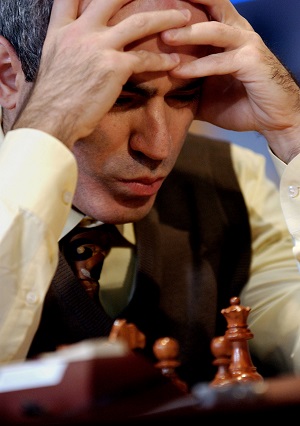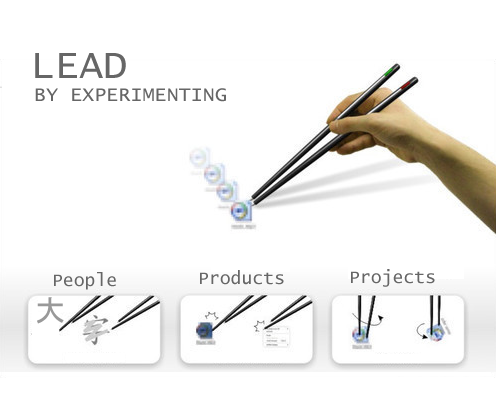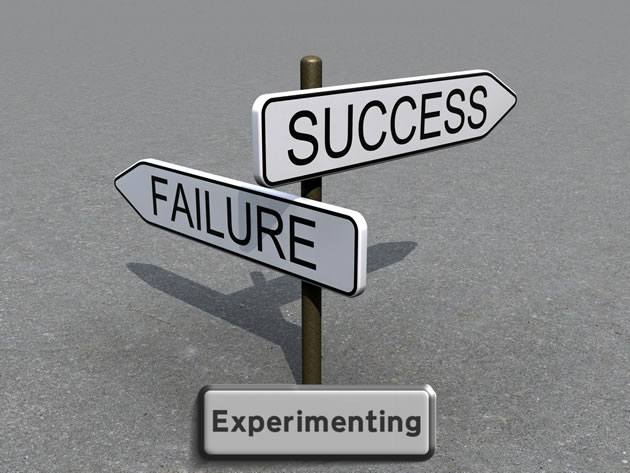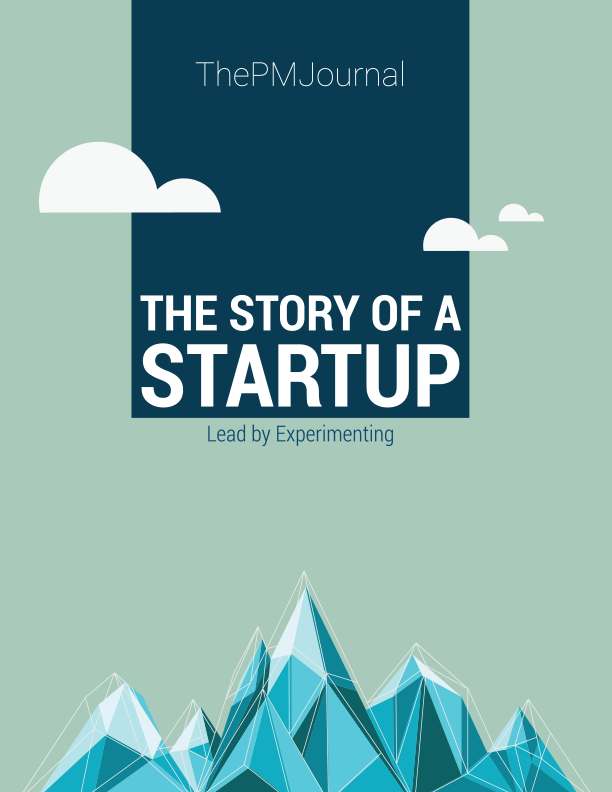Lead by Experimenting
Posted on October 1, 2013 by ThePMJournal
Not too long ago, I believed managers were born and not made… Also, I believed leaders posses some kind of power, almost hypnotic, that make them capable of leading masses, a capability which is beyond capabilities that most people.
Some said also, management is an art, so only natural skilled ones can perform it. You also probably heard people say: you are not made to be a manager… Ofcourse no one can provide a scientific argument why shouldn’t be you. Think about few centuries ago or few decades ago, when we lived without management as it is nowadays… people “get things done” just with some self-organization, hardworking, passion and responsability. So, the concept of modern management emerged recently, maybe few decades ago and, most important, it was a function invented by man. That’s why management is mostly a social science and an academic discipline.
During the years, while I accumulated a series of professional experiences, I reached the conclusion that true leaders (but also managers) are built, not born. Leaders were rised from masses, because of evolution. The trigger always was “a need”: the need of freedom, the need of welfare, the need of power, etc. The need always involve a learning process. For organizations, “the need” to become more efficient and to reach results in the optimal way created management. Since you can learn management and leadership in school, management is accesable to everyone, but to be a good managers only life can teach you. Why is that? Because no school can teach the “needs”, better than the life itself. Now, I strongly believe there isn’t any magic formula can teach you true leadership and management better than your own experience.
When I started to write this journal, I wanted to document any thoughts, emotions, experiences lived during the journey of a Startup (see The Story of a Startup). While writing, I figure out my logs entries, my notes are helping me to see the gaps in my theoretical background. In the end, personal notes provided me the opportunity to define my own way of practicing management. To be a better manager is not enough to know the management theory and leadership, but also you need to know how, when and what to apply from theory. All the way long, I tried also to test if theory is verified by real life. As in an experiment, I kept the record of my professional experiences, the results and conclusions by practicing management. Starting from these experiments, I created the concept of Lead by Experimenting (Lead by Experiment or Lead through Experiment) which could be translated by “become a better leader using your own experiences” or “find your own way of practicing management“.
To me, an experiment means not only to test if theory applies in real life, but also means to define my own theoretical system that can help me to find answers where theory cannot offer: How we make decisions? How can improve way of making decision? How can you know the importance of your decisions? Sometimes an experiment, by its own nature, can lead to unexpected results, unwanted effects and failures. Should we take experimental decision in a critical moment? Should take such risks, making experimental decisions in a critical situation, when its easy to apply the best practice or theory? To answer this we should ask first: What means to assume risks?
Each moment of our existence involves a risk (a risk is always just from the moment you start walking, from the moment you enter a building, etc), each decision in our existence is a risk (we decide to drive a car that can make an accident, we decide to choose a career that could prove after years was not inspired, etc). So, if in real life we assume so many risks, why not do the same in our professional life? In my opinion, I believe there are no “wrong” or “good” decision, but only “good” or “bad” results. We can tell about a decision was “good” or “wrong” only after we observe the results. In an unknown situation, the risk to reach to a “good” or “bad” result has the same probability. To decide to act or not to act, in an unknown situation, has the same probability risk. In other words, in a new situation, we don’t nothing to lose to take a decision whatever the result (“bad” or “good”).
We know that decisions lead to “bad” or “good” results. The experience set accumulated in our mind in decision-results “pairs”, are the basis (a database information) of the future decisions. Only by experimenting we could take better decision in the future!
An example from chess
The number of decisions a chess player should take is about millions in few seconds. Ramifications of decisions in chess have sometime theoretical complexity almost infinite (the number possible moves is equivalent with the number of atoms in the Universe). In other words, chess players have great dilemmas… The managers, fortunately, are never forced to take decisions with millions of implications in seconds like in chess and management, luckily, is not a game with so tight time limitations. But chess can be an inspiration point for all managers.
For most of the people, the chess is a sport of mind, a sport of logic. But even for a genius mind, to take a good decision from millions of options based only on logic (computations, formulas, etc.) could be a challenge. In an interview AtGoogleTalk, was invited Garry Kasparov (one of the most greatest chess player of history) to explain: How can he manages to take so great decision during a match in such a short time?
Garry’s answer was a bit surprising:
-In order to be a good player is not enough to make the best moves, but to know how much time to lose thinking at each move. And this we don’t do too often in business! Usually, the time we spend making decisions (in business) is proportional with importance of decisions.
The Garry was asked:
-Garry, how can you evaluate/estimate importance of your decisions? How much do you spend in order to make the best decisions? How can we improve the way of making decisions?
To answer, Garry used the resemblance with the strategy of “blitz” game:
-In chess you have the following constraint: time. If you play a blitz game you must understand that you need to sacrifice the quality of your decisions to be sure you won’t lose the game because of time.
 In the book, “How Life Imitates Chess“, Garry Kasparov describe a his vision about how decision can be made in life. In business, in personal life, we have almost the same constraints as in chess: “While time and material constraints are understandable, the quality (quality of the game) is a factor need to be adjusted according to our needs.”
In the book, “How Life Imitates Chess“, Garry Kasparov describe a his vision about how decision can be made in life. In business, in personal life, we have almost the same constraints as in chess: “While time and material constraints are understandable, the quality (quality of the game) is a factor need to be adjusted according to our needs.”
Sounds incredible similar with the theory of project management from PMBoK? Yes, it is. Here we are talking about four from total of seven constraints: resources (can be linked with material/pieces of chess game), time (timer clock), quality (quality of the game/points obtained in competitions/rating), customer satisfaction (our needs), scope (could be a friendly match without rating or a chess problem with a theme: studies, inverse mate, direct mate etc.), money (the effort and money invested in training, PR campaign, competitions) and risks.
According to Garry’s theory, the quality of the decisions depends indirectly on personal needs: some people needs to make decisions rapidly (i.e: a surgeon) , others slowly (example: DNA analysis).
-However, how big chess champions managed to make the so many good decisions, years after years, keeping the highest level of competitiveness?
At this question, Garry thinks the key, for always to take the right decisions or to improve the future decisions, is not to fear to make decisions.
So, Fear nothing!
It followed a justified question:
-How can you avoid doing mistakes but keeping the level of performance on a long term?
-If we don’t do mistakes, we are dead! In business and in life we want to reduce or to limit the chance of doing mistakes (a/n: But is wrong!) Mistakes are part of the process of thinking.
-So, we shouldn’t fear of failure? ask moderator.
-You need to be damn sure at some point you will fail! said Garry smiling. You must recognize the failure is inevitable. (By doing this, it will help you to accept the failure and not to fear) Recognizing failure, will build your level of confidence when you decide and the quality of later decisions!
Experiment!
Taking decisions is not based only on experiences. We all know the sport chess is logic, rational. Similar with chess, decisions in life are not based exclusively on previous experiences. However Garry Kasparov thinks in order to be combative at the very highest level, where the logic can’t make a difference between big champions, the decisions need to be taken strictly on experience (some call it intuition, instinct, gut).
So, in the end how we took decisions: logic or based on intuition?
The decisions always are logic, if we can rely on a argument (computations, predictions, analysis, past experiences, etc.), but in an unknown situation the decisions should be made strictly on past experience (own experience or collective experience).
That’s why, in order to take decisions more easily in the future, we need to gather a huge database of experiences. More experiences will make the future decision more easier to take and help you build your confidence we won’t fail.
However, to experiment also involves obtaining wrong results, failures, that’s why many people fear to experiment. But, we know there is no reason to fear because “making mistakes is part of the [natural] process of thinking (making decisions)”.
Final Notes
“The PM Journal” was created to keep a record of all my experiences (failures, successes, analysis, conclusions, lessons learned, etc) which define my own way of practicing management (Lead by Experiment).
The first time I started to document my experiences is the moment I have joined F-Startup. See The Story of a Startup.












What Others Are Saying